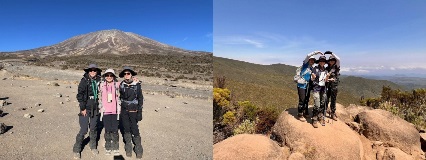
Mr Aakash Lamba
During Mr Aakash Lamba’s travels to the Indian Himalayas, he witnessed the devastating effects of environmental degradation. Many familiar places that were once pristine had become unrecognisable. Common wild animals are now endangered. That stark realisation prompted him to switch careers to become a conservation scientist.
Mr Lamba said: “My research has taken me to some incredible but increasingly threatened places. From photographing snow leopards in the high Himalayas to studying otters in the mangroves of peninsular India, I have been very fortunate to have such memorable experiences, which have only strengthened my commitment to preserving the irreplaceable wild species and ecosystems that nature has endowed us with.”
Today, the passionate advocate is pursuing his PhD at the NUS Centre for Nature-based Climate Solutions (CNCS). Backed by the NUS Research Scholarship, Mr Lamba is grateful for the financial support which has made his research possible.
He said: “The NUS Research Scholarship is a great opportunity to delve deeper into my research interests. I believe that research is a highly creative discipline that requires sustained support, both financial and academic. Having access to world-class researchers and state-of-the-art facilities is an important factor in making my research ideas a reality, which ultimately feeds into my goal of contributing to a more sustainable future.”
After leaving a lucrative career in technology in the United States, Mr Lamba dedicated himself to saving the environment. He took up a master's degree in Conservation Science at the Imperial College London. During his time studying in the United Kingdom, he founded “People for Pangolin”, a non-profit dedicated to pangolin rescue and rehabilitation work in Asia and Africa.
As a firm believer in sustainability solutions with real-world impact, he chose CNCS as the next stop in his green journey. At CNCS, Mr Lamba’s goal is to find holistic solutions that can achieve biodiversity conservation, climate change mitigation targets, and secure livelihoods for communities.
He said: “As someone who is deeply passionate about implementing actionable solutions for environmental conservation, I appreciate the emphasis that CNCS has on creating policy-relevant and inter-disciplinary research to catalyse environmental impact. Working with eminent scientists and thought leaders like Prof Koh Lian Pin, Director of CNCS, has been a privilege.”
As conservation advocates like Mr Lamba fight to protect our planet, they face setbacks and obstacles along the way. What keeps these eco-warriors going is the optimism that it’s not too late to win the battle.
He said: “It is no secret that we need to be doing more to address the environmental crises that we find ourselves in and staying optimistic in face of the global inaction, the lack of consensus and a barrage of worrying news can sometimes be challenging. Keeping this optimism alive, although sometimes difficult, is of paramount importance.”






